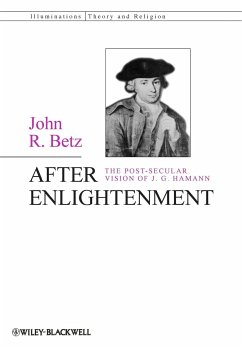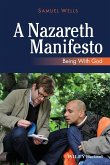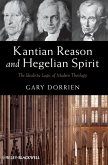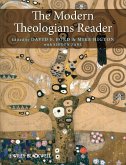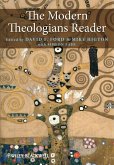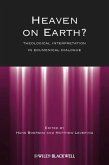After Enlightenment: Hamann as Post-Secular Visionary is a comprehensive introduction to the life and works of eighteenth-century German philosopher, J. G. Hamann, the founding father of what has come to be known as Radical Orthodoxy.
Provides a long-overdue, comprehensive introduction to Haman s fascinating life and controversial works, including his role as a friend and critic of Kant and some of the most renowned German intellectuals of the age
Features substantial new translations of the most important passages from across Hamann s writings, some of which have never been translated into English
Examines Hamann s highly original views on a range of topics, including faith, reason, revelation, Christianity, biblical exegesis, Socrates, theological aesthetics, language, sexuality, religion, politics, and the relationship between Judaism and Christianity
Presents Hamann as the founding father of a distinctly post-modern, post-secular theology and, as such, as an alternative to the postmodern triumvirate of Nietzsche, Heidegger, and Derrida
Considers Hamann s work as a touchtone of modern Jewish-Christian dialogue, in view of debates with his friend Moses Mendelssohn
Explores Hamann s role as the visionary founder of a metacritical movement that radically calls into question the basic principles of modern secular reason, and thus reprises the debate between those defending Hamann s views and those labeling him the bête noir of the Enlightenment
Hinweis: Dieser Artikel kann nur an eine deutsche Lieferadresse ausgeliefert werden.
Provides a long-overdue, comprehensive introduction to Haman s fascinating life and controversial works, including his role as a friend and critic of Kant and some of the most renowned German intellectuals of the age
Features substantial new translations of the most important passages from across Hamann s writings, some of which have never been translated into English
Examines Hamann s highly original views on a range of topics, including faith, reason, revelation, Christianity, biblical exegesis, Socrates, theological aesthetics, language, sexuality, religion, politics, and the relationship between Judaism and Christianity
Presents Hamann as the founding father of a distinctly post-modern, post-secular theology and, as such, as an alternative to the postmodern triumvirate of Nietzsche, Heidegger, and Derrida
Considers Hamann s work as a touchtone of modern Jewish-Christian dialogue, in view of debates with his friend Moses Mendelssohn
Explores Hamann s role as the visionary founder of a metacritical movement that radically calls into question the basic principles of modern secular reason, and thus reprises the debate between those defending Hamann s views and those labeling him the bête noir of the Enlightenment
Hinweis: Dieser Artikel kann nur an eine deutsche Lieferadresse ausgeliefert werden.
"This is a scholar's book, breaking new ground in the study of eighteenth-century philosophy, and those responsible for teaching modern philosophy and theology should be warned: on picking up this book, you risk having to revise substantial portions of your lectures. This is the sort of book that ought to change the way we think about Europe's so-called Enlightenment, and the intellectual paths that we have walked ever since." (Anglican Theological Review, 2012)
"Simply put, Betz's accomplishment is superb. He comprehensively introduces the entire span of Hamann's work in its theological and philosophical significance ... though much remains to be done in thinking with Hamann, Betz's work is a major accomplishment that deserves wide readership." --Lutheran Quarterly
"This is an important book for at least two reasons. On the one hand, it is a complete, reliable, and agreeably written introduction to Johann Georg Hamann's life, work and world. On the other hand, it contributes substantially to the ongoing discussion in contemporary theology and philosophy about the seemingly ineradicable tension between modernity and Christianity." --Modern Theology
"After Enlightenment has much to offer those who are familiar with Hamann, as well as those who are not. The way Betz handles Hamann's difficult writings and communicates his thought is a clear and precise manner is praiseworthy ... The comprehensiveness of the study is enhanced by the ease of Betz's prose, offering a tremendous tool for understanding the enigmatic yet fruitful 'Magus of the North'." --Journal of the Evangelical Theological Society
"[Betz] has produced the best and fullest survey of the life and writings of Johann Georg Hamann in a generation, helpfully including many passages from Hamann's letters and publications and commenting intelligently on the style, theology, philosophy, and (to a lesser extent) historical context of Hamann's notoriously obscure oeuvre; second, he has written an intellectual history covering Hamann's relation to the major figures of his time as well as his subsequent influence on and reception by philosophers and theologians down to our own day." --Church History
"Simply put, Betz's accomplishment is superb. He comprehensively introduces the entire span of Hamann's work in its theological and philosophical significance ... though much remains to be done in thinking with Hamann, Betz's work is a major accomplishment that deserves wide readership." --Lutheran Quarterly
"This is an important book for at least two reasons. On the one hand, it is a complete, reliable, and agreeably written introduction to Johann Georg Hamann's life, work and world. On the other hand, it contributes substantially to the ongoing discussion in contemporary theology and philosophy about the seemingly ineradicable tension between modernity and Christianity." --Modern Theology
"After Enlightenment has much to offer those who are familiar with Hamann, as well as those who are not. The way Betz handles Hamann's difficult writings and communicates his thought is a clear and precise manner is praiseworthy ... The comprehensiveness of the study is enhanced by the ease of Betz's prose, offering a tremendous tool for understanding the enigmatic yet fruitful 'Magus of the North'." --Journal of the Evangelical Theological Society
"[Betz] has produced the best and fullest survey of the life and writings of Johann Georg Hamann in a generation, helpfully including many passages from Hamann's letters and publications and commenting intelligently on the style, theology, philosophy, and (to a lesser extent) historical context of Hamann's notoriously obscure oeuvre; second, he has written an intellectual history covering Hamann's relation to the major figures of his time as well as his subsequent influence on and reception by philosophers and theologians down to our own day." --Church History

